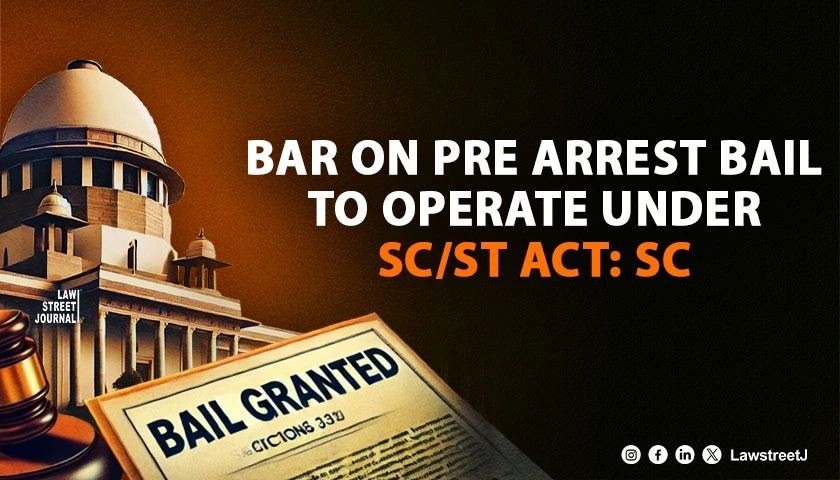NEW DELHI: In a judgment, the Supreme Court has said, in relation to any case involving arrest of a person, facing the accusation about committing offence under the Scheduled Castes and Scheduled Tribes (Prevention of Atrocities) Act, protection of Section 438, CrPC would not be available.
"The Legislature has taken away the benefit of anticipatory bail in respect of the arrest for the offences alleged under the SC/ST Act. The bar in Section 18 of the SC/ST Act would operate," a bench headed by Chief Justice of India B R Gavai said.
The court said that there is a bar on anticipatory bail for an accused under the SC/ST Act but if the accusations relating to the commission of such offence are devoid of prima facie merits, the court has a room to exercise its discretion to grant pre-arrest bail.
The court clarified, non-making of prima facie case about the commission of offence is perceived to be such a situation where the court can arrive at such a conclusion in the first blush itself or by way of the first impression upon very reading of the averments in the FIR.
In such cases, the bench, also comprising Justices K Vinod Chandran and N V Anjaria, said, it would not be permissible for the court to travel into the evidentiary realm or to consider other materials, nor the court could advert to conduct a mini trial.
"The provision of Section 18 and the bar created thereunder has to be seen in the context of the object and purpose with which the Parliament enacted the SC/SC Act, 1989," the bench said.
The bench pointed out, this legislation was brought into force with an avowed object of implementing the measures to improve the socio-economic conditions of the Scheduled Castes and Scheduled Tribes, who have remained a vulnerable class in the society.
Also Watch
"The underlying idea is to ensure that the persons belonging to these classes are not denied their civil rights, are not subjected to indignities and are insulated from humiliation and harassment,'' the court said.
Section 18 in its ultimate analysis, furthers the very object of the enactment, it said.
"Seemingly a stricter provision, it underscores the constitutional idea of availing social justice and to ensure the same pedestal for the Scheduled Caste and Scheduled Tribe community people with other classes in the society,'' the bench said.
Allowing an appeal by Kiran against the Bombay High Court's order which granted pre-arrest bail to Rajkumar Jivraj Jain, the court noted, the respondent accused and others were alleged to have assaulted the appellant-complainant and her family members and hurled caste abuses for not voting a particular candidate in Maharashtra Assembly elections.
In view of the contents of the FIR, the court said, there is no escape from the conclusion that offence under the Scheduled Caste and Scheduled Tribe (Prevention of Atrocities) Act, 1989 was made out.
The High Court in proceeding to evaluate the testimony of witnesses and to opine on that basis that there were certain discrepancies, no offence was made out, committed a manifest error, it held.
"The anticipatory bail granted by overlooking of and disregarding the bar of Section 18 of the Act was a clear illegality and jurisdictional error committed by the High Court. The order of the High Court could not be sustained in the eye of law,'' the court said.
Disclaimer: This content is produced and published by LawStreet Journal Media for informational purposes only and does not constitute legal advice. The views expressed are independent of any legal practice of the individuals involved.

















